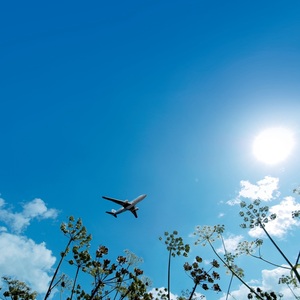KLM remains committed to sustainable aviation fuel

February 2, 2021
BY KLM
KLM’s Corporate BioFuel Programme has been renamed the KLM Corporate SAF Programme. SAF stands for Sustainable Aviation Fuel. KLM has opted for this new name to make it clear that the fuel it buys is manufactured sustainably, using raw materials that do not cause deforestation, impede food production or harm the environment in any other way. This new name will also mark the start of an initiative to bring the program to the attention of businesses outside the Netherlands.
“Sustainable Aviation Fuel is not necessarily the same as biofuel. The fact that something is made from organic raw materials, does not necessarily imply that it is sustainable. This led to some confusion,” explains Karel Bockstael, vice president of Sustainability at KLM. “For KLM, the term SAF better describes the alternative we use instead of fossil fuel. The fuel we use is truly sustainable and does not lead to deforestation or replace food production. SAF also includes alternative fuels that are, for instance, made of CO2, renewable energy and water, better known as ‘synthetic kerosene’. This field is undergoing strong development, which is why it is logical that we have decided to rename our corporate programme.”
Sixteen members
The KLM Corporate SAF Programme was launched in 2012 and now includes sixteen partners, including ABN AMRO, Royal Schiphol Group and Arcadis. These businesses and institutions help KLM finance the purchase of SAF, thereby reducing the CO2 footprint of their business travel by air. SAF can reduce CO2 emissions by 85 percent compared to fossil kerosene, but because it is in short supply and expensive to produce, it is three times more expensive. The SAF purchased by KLM is mixed with fossil fuel and pumped into the refuelling systems at Amsterdam Airport Schiphol and in Los Angeles. The SAF is produced and supplied locally at both locations. The total amount of SAF used by KLM in 2019 amounted to less than 1 percent of all fuel used by KLM.
“That’s less than we would like, of course. We will need to use a lot more of this fuel to substantially reduce CO2 emissions,” explains Harm Kreulen, director of KLM Benelux. “That is why we will continue to bring the KLM Corporate SAF Programme to the attention of our customers, specifically in this time of crisis. This is the ideal moment for KLM to pursue its ambition to become even more sustainable. The drastic reduction of our CO2 footprint, with the aid of fleet modernization, improved operational efficiency and SAF, plays an essential part in this ambition.”
Advertisement
Advertisement
Advertisement
Advertisement
Related Stories
The U.S EPA on July 17 released data showing more than 1.9 billion RINs were generated under the RFS during June, down 11% when compared to the same month of last year. Total RIN generation for the first half of 2025 reached 11.17 billion.
The U.S. EPA on July 17 published updated small refinery exemption (SRE) data, reporting that six new SRE petitions have been filed under the RFS during the past month. A total of 195 SRE petitions are now pending.
European biodiesel producer Greenergy on July 10 confirmed plans to shut down its biodiesel plant in Immingham, Lincolnshire, U.K. The company temporarily suspended operations at the facility earlier this year.
Aemetis Inc., a renewable natural gas and biofuels company, announced on July 17 that its India subsidiary, Universal Biofuels, appointed Anjaneyulu Ganji as chief financial officer, effective July 17.
Avia Solutions Group, the world's largest ACMI (aircraft, crew, maintenance, and insurance) provider, has partnered with DHL Express to reduce greenhouse gas emissions from its international shipments using SAF.
Upcoming Events










